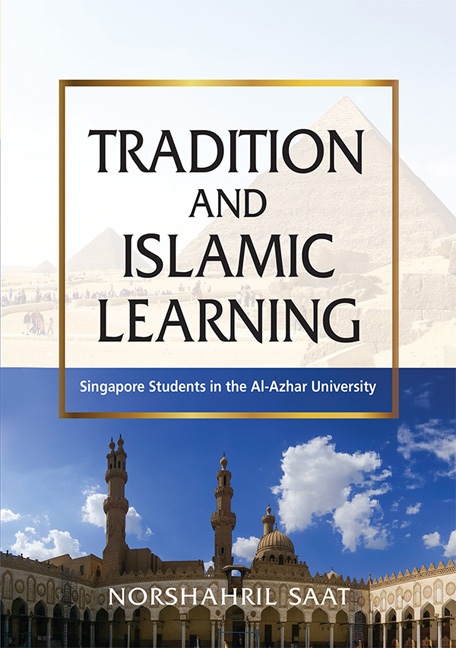Book contents
- Frontmatter
- Dedication
- Contents
- Preface
- Acknowledgements
- Abbreviations
- A Note on Translation, Spelling and Other Conventions
- Chapter 1 Introduction: Islamic Education and Religious Authority
- Chapter 2 The Al-Azhar University: A Historical Sketch
- Chapter 3 Prominent Southeast Asian Al-Azhar Graduates
- Chapter 4 Al-Azhar Today: The Experience of Singapore Students
- Chapter 5 Conclusion
- Bibliography
- Index
- About the Author
Chapter 4 - Al-Azhar Today: The Experience of Singapore Students
Published online by Cambridge University Press: 04 July 2018
- Frontmatter
- Dedication
- Contents
- Preface
- Acknowledgements
- Abbreviations
- A Note on Translation, Spelling and Other Conventions
- Chapter 1 Introduction: Islamic Education and Religious Authority
- Chapter 2 The Al-Azhar University: A Historical Sketch
- Chapter 3 Prominent Southeast Asian Al-Azhar Graduates
- Chapter 4 Al-Azhar Today: The Experience of Singapore Students
- Chapter 5 Conclusion
- Bibliography
- Index
- About the Author
Summary
Aspiring Southeast Asian religious teachers regard the Al-Azhar University as one of the best Islamic centres of learning in the world. Some of the current students posit that their parents encouraged them to pursue their education at the university. Some were inspired by their local teachers, who are also alumni of the university. Many young religious teachers I spoke to idolized the Al-Azhar University, and quite a number mentioned that it was their childhood dream to study there. Current Singapore Al-Azhar undergraduate, Abdul Malek, mentioned that the very first time he entered one of Al-Azhar's lecture halls, he recalled: “Oh! Syed Isa Semait used to sit here, and so did Dr Fatris Bakaram!”. Abdul Malek felt that his idols used to be students of the university, and many other Singapore Al-Azhar students will follow their trajectory and become religious scholars in Singapore. Others shared having some form of spiritual attachment to the university, claiming that “Al-Azhar is the land that gave birth to many prophets”. All these factors add up to the reasons why many Southeast Asian students, including those from Singapore madrasahs, aspire to study in Al-Azhar.
Al-Azhar has produced many ulama in the region, trained in theology, exegesis, jurisprudence, Hadith (narrations by the Prophet Muhammad) and morality from Al-Azhar. Despite graduating from the same institution, the religious outlook of Al-Azhar former students varies from one to another. There is no one “Al-Azhar school of thought” that graduates suggest. When asked what studying in the university entails, the graduates would say: Al-Azhar teaches moderate Islam or wasatiyyah. What the students hope to achieve at Al-Azhar may not necessarily be accomplished. As discussed in Chapter 3, upon returning to their country of origins, Al-Azhar graduates ventured into different fields; most came back as religious teachers, while others joined the bureaucracy, started their own businesses, and went into politics. For those who went into politics, they may even join opposing camps.
- Type
- Chapter
- Information
- Tradition and Islamic LearningSingapore Students in the Al-Azhar University, pp. 54 - 92Publisher: ISEAS–Yusof Ishak InstitutePrint publication year: 2018

